Management Perspective
VerifiedAdded on 2022/11/28
|10
|3103
|359
AI Summary
This assignment discusses the concept of perspectives of management in the context of business organizations, with a focus on Woolworths Supermarket. It explores organizational theories, research strategies, the role of ethics, and the influence of the social and political environment on the effectiveness of Woolworths. The assignment provides insights into management aspects, research methodology, and the success of the business organization.
Contribute Materials
Your contribution can guide someone’s learning journey. Share your
documents today.
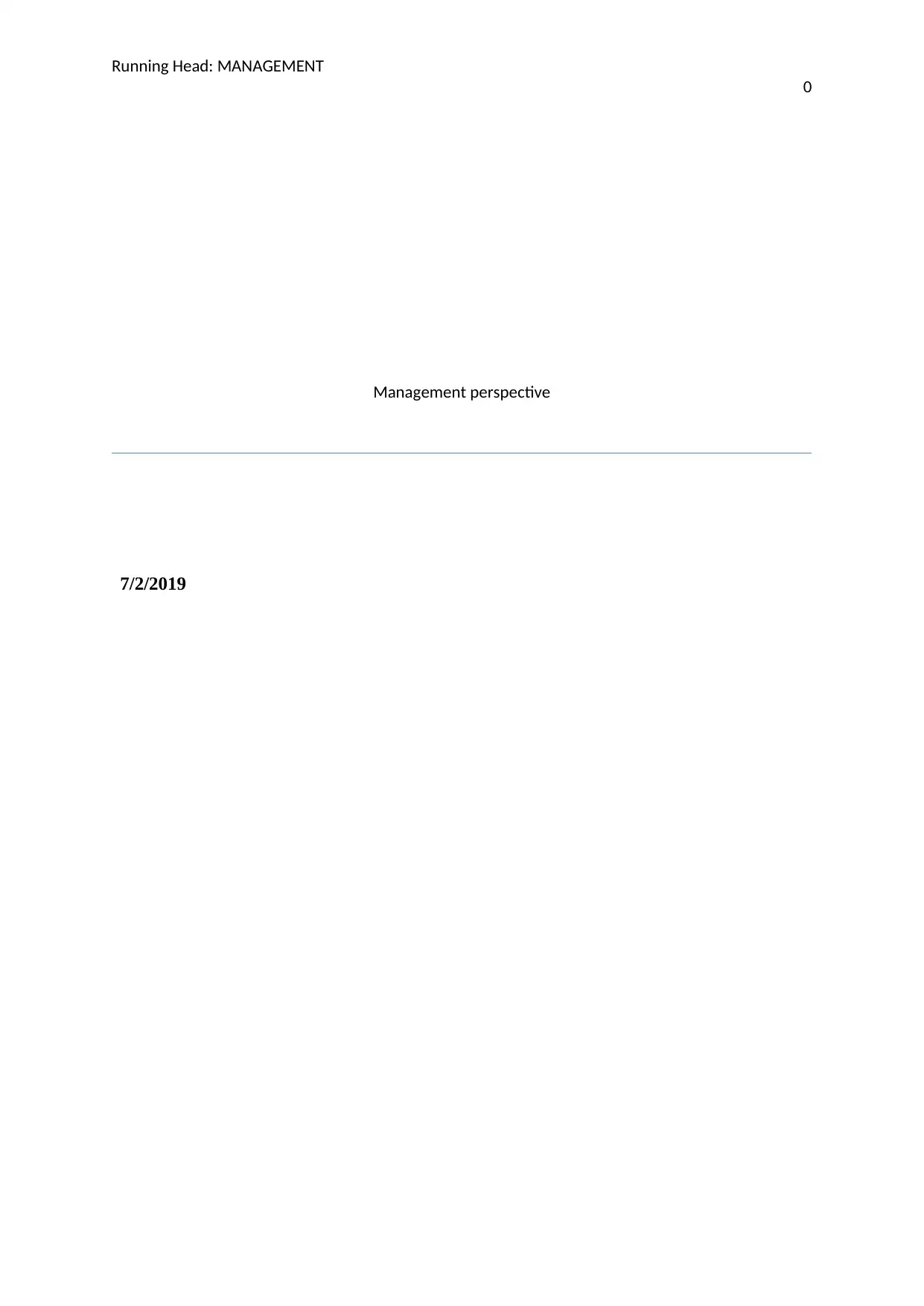
Running Head: MANAGEMENT
0
Management perspective
7/2/2019
0
Management perspective
7/2/2019
Secure Best Marks with AI Grader
Need help grading? Try our AI Grader for instant feedback on your assignments.
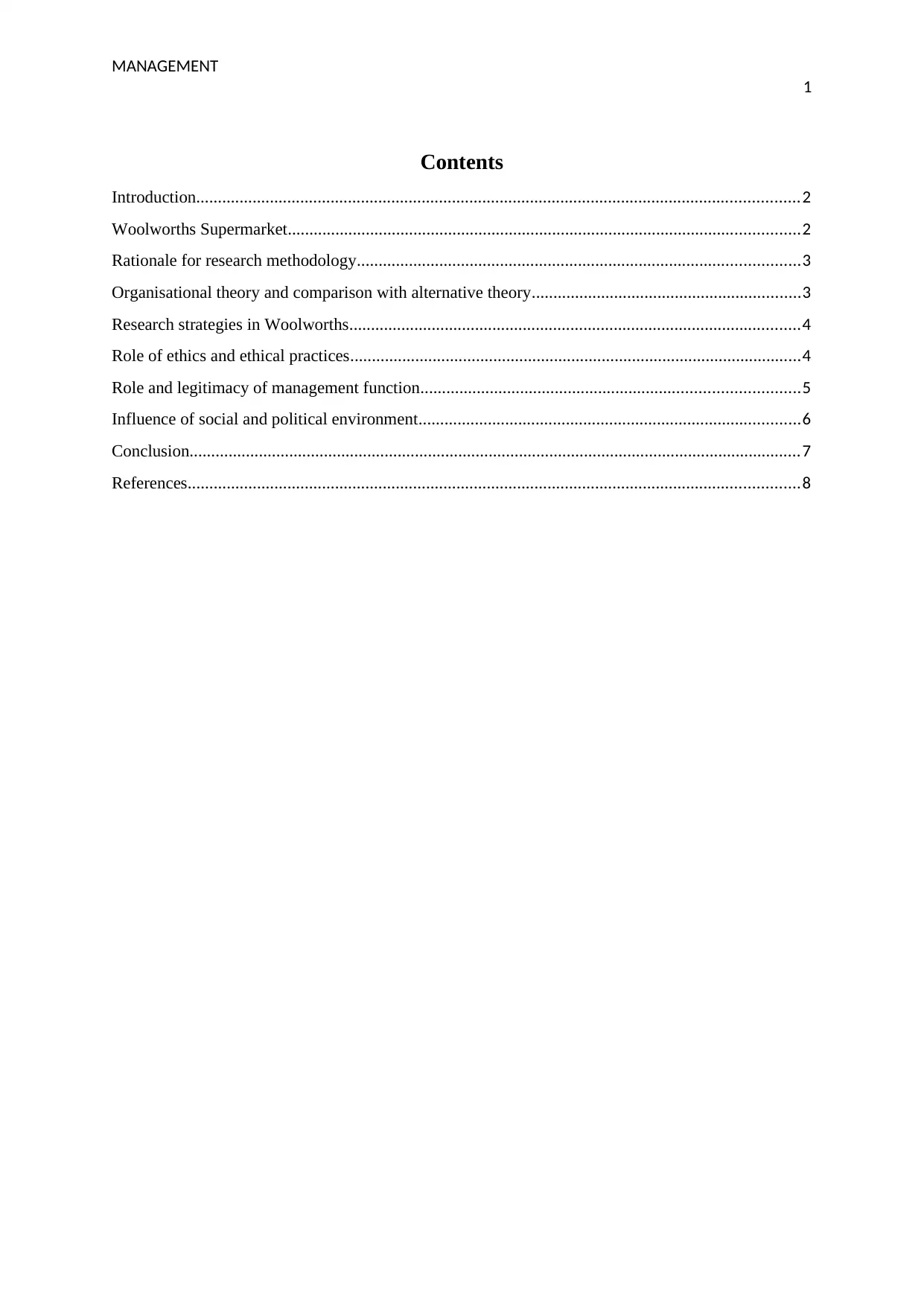
MANAGEMENT
1
Contents
Introduction...........................................................................................................................................2
Woolworths Supermarket......................................................................................................................2
Rationale for research methodology......................................................................................................3
Organisational theory and comparison with alternative theory..............................................................3
Research strategies in Woolworths........................................................................................................4
Role of ethics and ethical practices........................................................................................................4
Role and legitimacy of management function.......................................................................................5
Influence of social and political environment........................................................................................6
Conclusion.............................................................................................................................................7
References.............................................................................................................................................8
1
Contents
Introduction...........................................................................................................................................2
Woolworths Supermarket......................................................................................................................2
Rationale for research methodology......................................................................................................3
Organisational theory and comparison with alternative theory..............................................................3
Research strategies in Woolworths........................................................................................................4
Role of ethics and ethical practices........................................................................................................4
Role and legitimacy of management function.......................................................................................5
Influence of social and political environment........................................................................................6
Conclusion.............................................................................................................................................7
References.............................................................................................................................................8
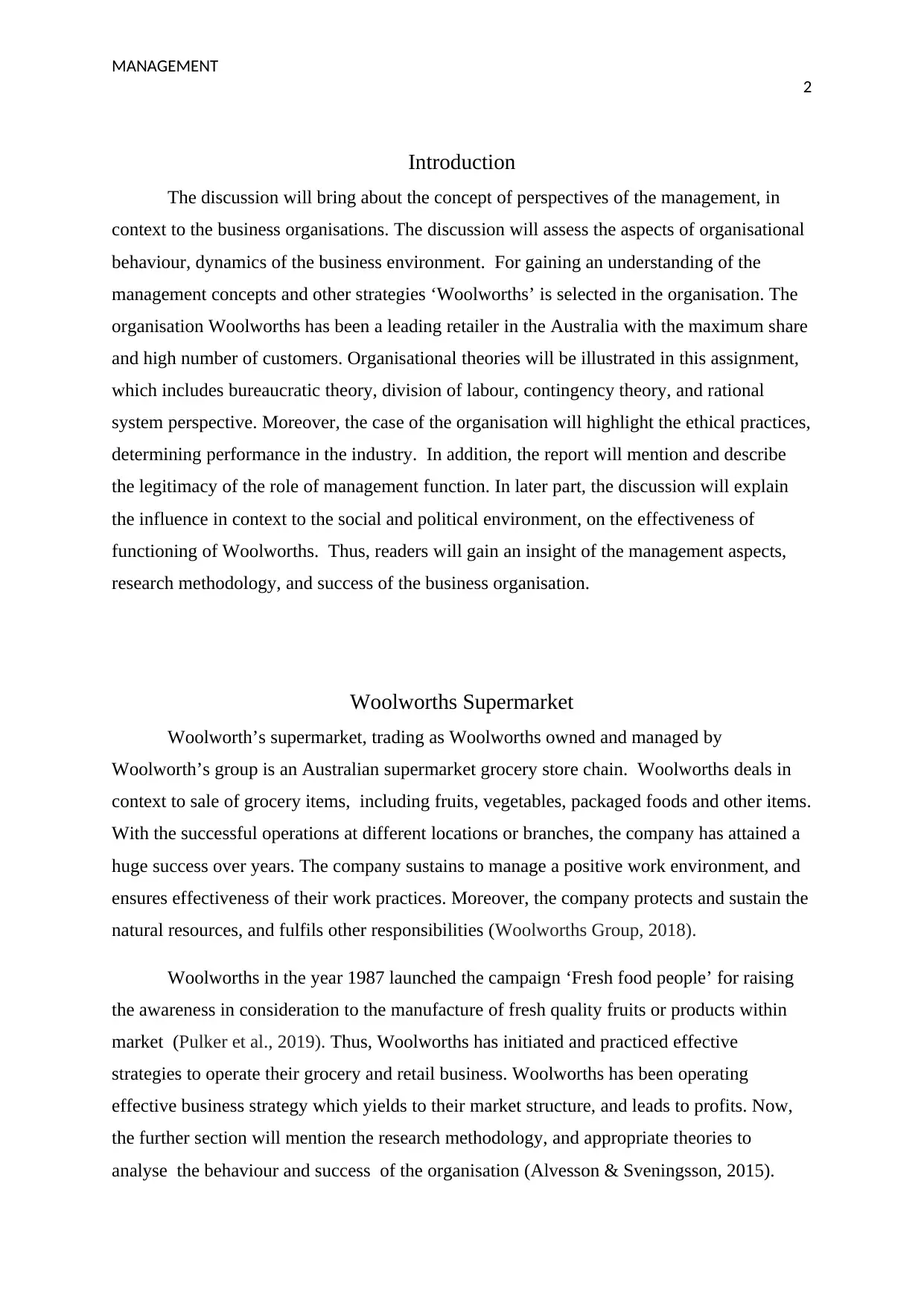
MANAGEMENT
2
Introduction
The discussion will bring about the concept of perspectives of the management, in
context to the business organisations. The discussion will assess the aspects of organisational
behaviour, dynamics of the business environment. For gaining an understanding of the
management concepts and other strategies ‘Woolworths’ is selected in the organisation. The
organisation Woolworths has been a leading retailer in the Australia with the maximum share
and high number of customers. Organisational theories will be illustrated in this assignment,
which includes bureaucratic theory, division of labour, contingency theory, and rational
system perspective. Moreover, the case of the organisation will highlight the ethical practices,
determining performance in the industry. In addition, the report will mention and describe
the legitimacy of the role of management function. In later part, the discussion will explain
the influence in context to the social and political environment, on the effectiveness of
functioning of Woolworths. Thus, readers will gain an insight of the management aspects,
research methodology, and success of the business organisation.
Woolworths Supermarket
Woolworth’s supermarket, trading as Woolworths owned and managed by
Woolworth’s group is an Australian supermarket grocery store chain. Woolworths deals in
context to sale of grocery items, including fruits, vegetables, packaged foods and other items.
With the successful operations at different locations or branches, the company has attained a
huge success over years. The company sustains to manage a positive work environment, and
ensures effectiveness of their work practices. Moreover, the company protects and sustain the
natural resources, and fulfils other responsibilities (Woolworths Group, 2018).
Woolworths in the year 1987 launched the campaign ‘Fresh food people’ for raising
the awareness in consideration to the manufacture of fresh quality fruits or products within
market (Pulker et al., 2019). Thus, Woolworths has initiated and practiced effective
strategies to operate their grocery and retail business. Woolworths has been operating
effective business strategy which yields to their market structure, and leads to profits. Now,
the further section will mention the research methodology, and appropriate theories to
analyse the behaviour and success of the organisation (Alvesson & Sveningsson, 2015).
2
Introduction
The discussion will bring about the concept of perspectives of the management, in
context to the business organisations. The discussion will assess the aspects of organisational
behaviour, dynamics of the business environment. For gaining an understanding of the
management concepts and other strategies ‘Woolworths’ is selected in the organisation. The
organisation Woolworths has been a leading retailer in the Australia with the maximum share
and high number of customers. Organisational theories will be illustrated in this assignment,
which includes bureaucratic theory, division of labour, contingency theory, and rational
system perspective. Moreover, the case of the organisation will highlight the ethical practices,
determining performance in the industry. In addition, the report will mention and describe
the legitimacy of the role of management function. In later part, the discussion will explain
the influence in context to the social and political environment, on the effectiveness of
functioning of Woolworths. Thus, readers will gain an insight of the management aspects,
research methodology, and success of the business organisation.
Woolworths Supermarket
Woolworth’s supermarket, trading as Woolworths owned and managed by
Woolworth’s group is an Australian supermarket grocery store chain. Woolworths deals in
context to sale of grocery items, including fruits, vegetables, packaged foods and other items.
With the successful operations at different locations or branches, the company has attained a
huge success over years. The company sustains to manage a positive work environment, and
ensures effectiveness of their work practices. Moreover, the company protects and sustain the
natural resources, and fulfils other responsibilities (Woolworths Group, 2018).
Woolworths in the year 1987 launched the campaign ‘Fresh food people’ for raising
the awareness in consideration to the manufacture of fresh quality fruits or products within
market (Pulker et al., 2019). Thus, Woolworths has initiated and practiced effective
strategies to operate their grocery and retail business. Woolworths has been operating
effective business strategy which yields to their market structure, and leads to profits. Now,
the further section will mention the research methodology, and appropriate theories to
analyse the behaviour and success of the organisation (Alvesson & Sveningsson, 2015).
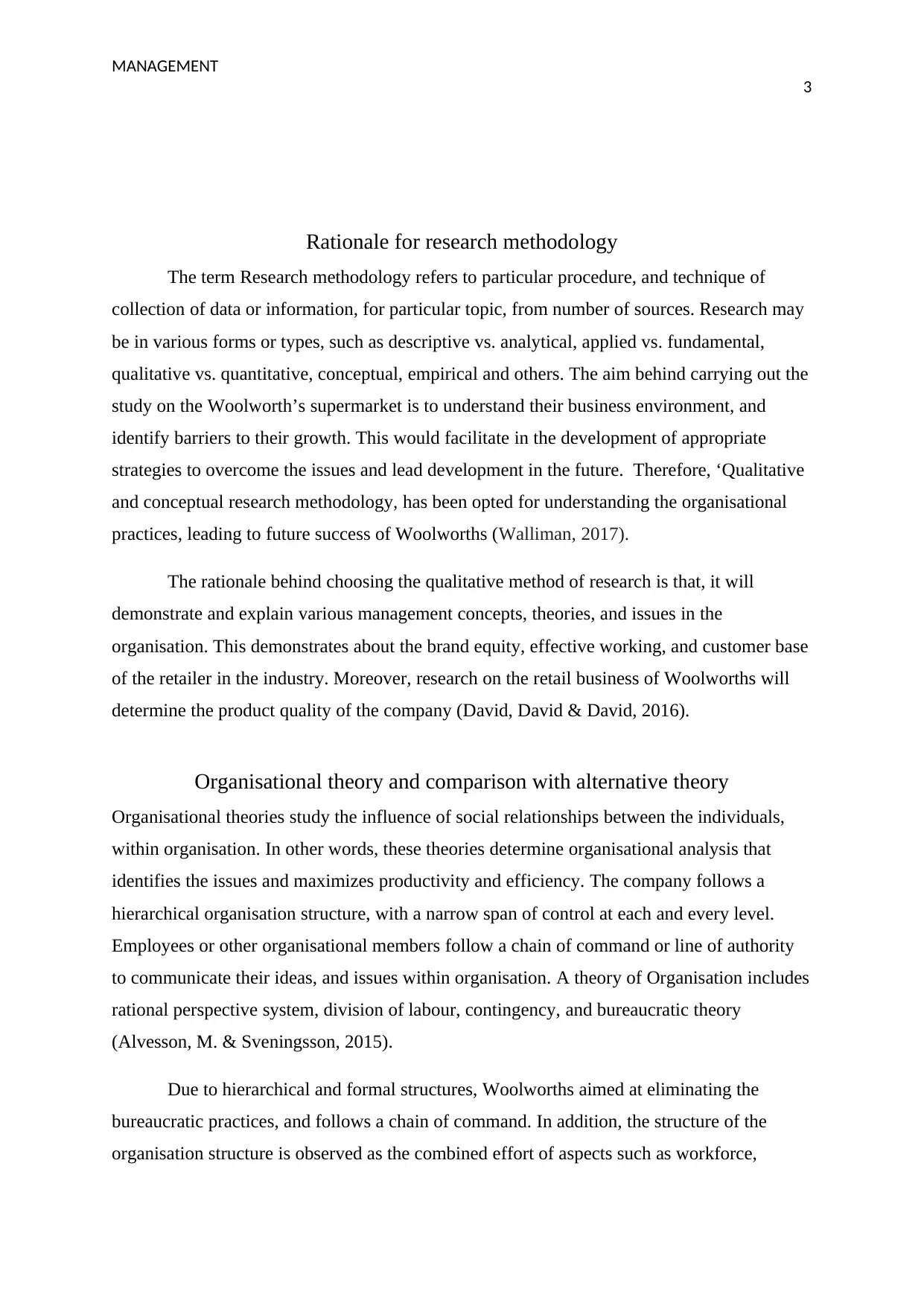
MANAGEMENT
3
Rationale for research methodology
The term Research methodology refers to particular procedure, and technique of
collection of data or information, for particular topic, from number of sources. Research may
be in various forms or types, such as descriptive vs. analytical, applied vs. fundamental,
qualitative vs. quantitative, conceptual, empirical and others. The aim behind carrying out the
study on the Woolworth’s supermarket is to understand their business environment, and
identify barriers to their growth. This would facilitate in the development of appropriate
strategies to overcome the issues and lead development in the future. Therefore, ‘Qualitative
and conceptual research methodology, has been opted for understanding the organisational
practices, leading to future success of Woolworths (Walliman, 2017).
The rationale behind choosing the qualitative method of research is that, it will
demonstrate and explain various management concepts, theories, and issues in the
organisation. This demonstrates about the brand equity, effective working, and customer base
of the retailer in the industry. Moreover, research on the retail business of Woolworths will
determine the product quality of the company (David, David & David, 2016).
Organisational theory and comparison with alternative theory
Organisational theories study the influence of social relationships between the individuals,
within organisation. In other words, these theories determine organisational analysis that
identifies the issues and maximizes productivity and efficiency. The company follows a
hierarchical organisation structure, with a narrow span of control at each and every level.
Employees or other organisational members follow a chain of command or line of authority
to communicate their ideas, and issues within organisation. A theory of Organisation includes
rational perspective system, division of labour, contingency, and bureaucratic theory
(Alvesson, M. & Sveningsson, 2015).
Due to hierarchical and formal structures, Woolworths aimed at eliminating the
bureaucratic practices, and follows a chain of command. In addition, the structure of the
organisation structure is observed as the combined effort of aspects such as workforce,
3
Rationale for research methodology
The term Research methodology refers to particular procedure, and technique of
collection of data or information, for particular topic, from number of sources. Research may
be in various forms or types, such as descriptive vs. analytical, applied vs. fundamental,
qualitative vs. quantitative, conceptual, empirical and others. The aim behind carrying out the
study on the Woolworth’s supermarket is to understand their business environment, and
identify barriers to their growth. This would facilitate in the development of appropriate
strategies to overcome the issues and lead development in the future. Therefore, ‘Qualitative
and conceptual research methodology, has been opted for understanding the organisational
practices, leading to future success of Woolworths (Walliman, 2017).
The rationale behind choosing the qualitative method of research is that, it will
demonstrate and explain various management concepts, theories, and issues in the
organisation. This demonstrates about the brand equity, effective working, and customer base
of the retailer in the industry. Moreover, research on the retail business of Woolworths will
determine the product quality of the company (David, David & David, 2016).
Organisational theory and comparison with alternative theory
Organisational theories study the influence of social relationships between the individuals,
within organisation. In other words, these theories determine organisational analysis that
identifies the issues and maximizes productivity and efficiency. The company follows a
hierarchical organisation structure, with a narrow span of control at each and every level.
Employees or other organisational members follow a chain of command or line of authority
to communicate their ideas, and issues within organisation. A theory of Organisation includes
rational perspective system, division of labour, contingency, and bureaucratic theory
(Alvesson, M. & Sveningsson, 2015).
Due to hierarchical and formal structures, Woolworths aimed at eliminating the
bureaucratic practices, and follows a chain of command. In addition, the structure of the
organisation structure is observed as the combined effort of aspects such as workforce,
Secure Best Marks with AI Grader
Need help grading? Try our AI Grader for instant feedback on your assignments.
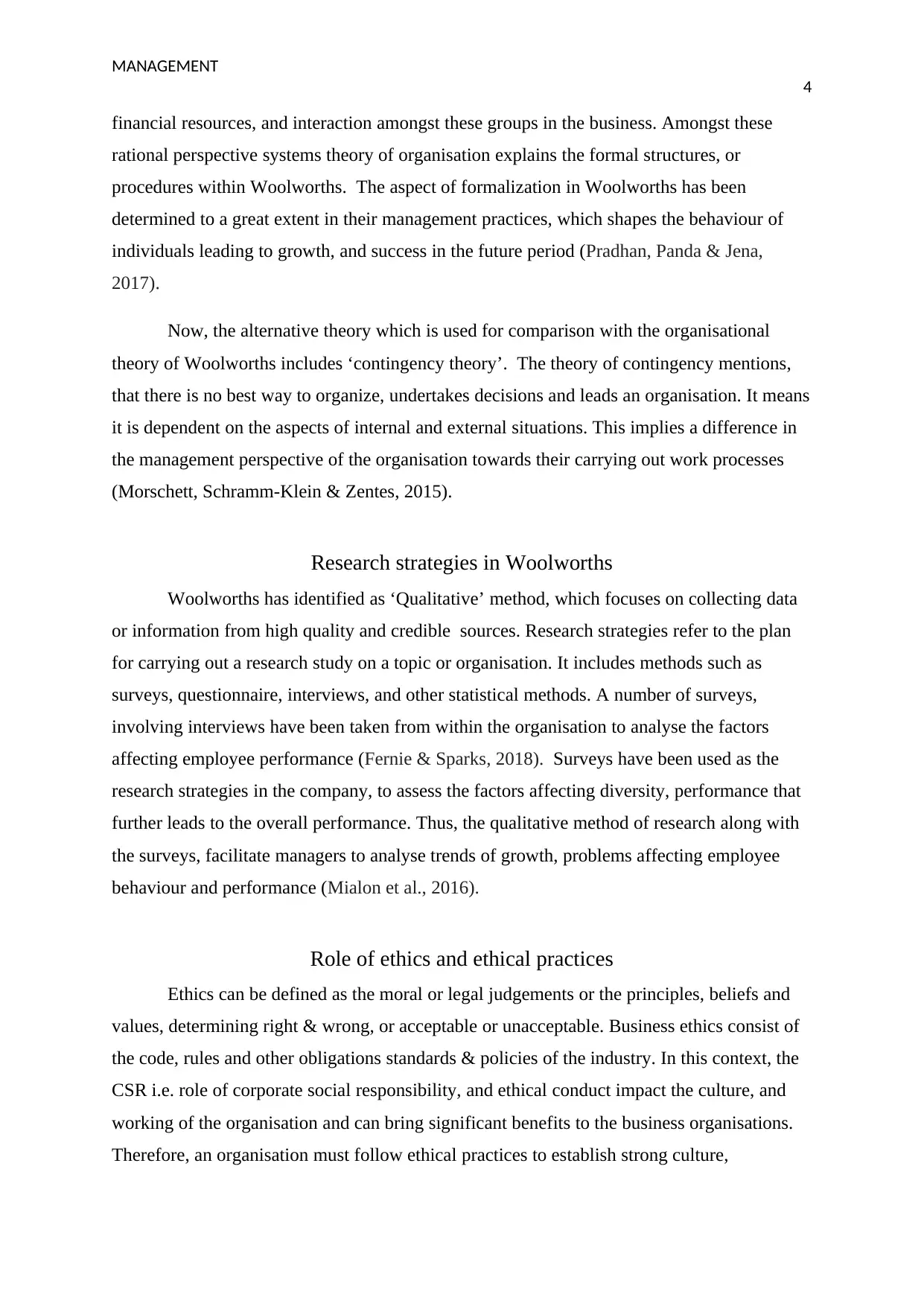
MANAGEMENT
4
financial resources, and interaction amongst these groups in the business. Amongst these
rational perspective systems theory of organisation explains the formal structures, or
procedures within Woolworths. The aspect of formalization in Woolworths has been
determined to a great extent in their management practices, which shapes the behaviour of
individuals leading to growth, and success in the future period (Pradhan, Panda & Jena,
2017).
Now, the alternative theory which is used for comparison with the organisational
theory of Woolworths includes ‘contingency theory’. The theory of contingency mentions,
that there is no best way to organize, undertakes decisions and leads an organisation. It means
it is dependent on the aspects of internal and external situations. This implies a difference in
the management perspective of the organisation towards their carrying out work processes
(Morschett, Schramm-Klein & Zentes, 2015).
Research strategies in Woolworths
Woolworths has identified as ‘Qualitative’ method, which focuses on collecting data
or information from high quality and credible sources. Research strategies refer to the plan
for carrying out a research study on a topic or organisation. It includes methods such as
surveys, questionnaire, interviews, and other statistical methods. A number of surveys,
involving interviews have been taken from within the organisation to analyse the factors
affecting employee performance (Fernie & Sparks, 2018). Surveys have been used as the
research strategies in the company, to assess the factors affecting diversity, performance that
further leads to the overall performance. Thus, the qualitative method of research along with
the surveys, facilitate managers to analyse trends of growth, problems affecting employee
behaviour and performance (Mialon et al., 2016).
Role of ethics and ethical practices
Ethics can be defined as the moral or legal judgements or the principles, beliefs and
values, determining right & wrong, or acceptable or unacceptable. Business ethics consist of
the code, rules and other obligations standards & policies of the industry. In this context, the
CSR i.e. role of corporate social responsibility, and ethical conduct impact the culture, and
working of the organisation and can bring significant benefits to the business organisations.
Therefore, an organisation must follow ethical practices to establish strong culture,
4
financial resources, and interaction amongst these groups in the business. Amongst these
rational perspective systems theory of organisation explains the formal structures, or
procedures within Woolworths. The aspect of formalization in Woolworths has been
determined to a great extent in their management practices, which shapes the behaviour of
individuals leading to growth, and success in the future period (Pradhan, Panda & Jena,
2017).
Now, the alternative theory which is used for comparison with the organisational
theory of Woolworths includes ‘contingency theory’. The theory of contingency mentions,
that there is no best way to organize, undertakes decisions and leads an organisation. It means
it is dependent on the aspects of internal and external situations. This implies a difference in
the management perspective of the organisation towards their carrying out work processes
(Morschett, Schramm-Klein & Zentes, 2015).
Research strategies in Woolworths
Woolworths has identified as ‘Qualitative’ method, which focuses on collecting data
or information from high quality and credible sources. Research strategies refer to the plan
for carrying out a research study on a topic or organisation. It includes methods such as
surveys, questionnaire, interviews, and other statistical methods. A number of surveys,
involving interviews have been taken from within the organisation to analyse the factors
affecting employee performance (Fernie & Sparks, 2018). Surveys have been used as the
research strategies in the company, to assess the factors affecting diversity, performance that
further leads to the overall performance. Thus, the qualitative method of research along with
the surveys, facilitate managers to analyse trends of growth, problems affecting employee
behaviour and performance (Mialon et al., 2016).
Role of ethics and ethical practices
Ethics can be defined as the moral or legal judgements or the principles, beliefs and
values, determining right & wrong, or acceptable or unacceptable. Business ethics consist of
the code, rules and other obligations standards & policies of the industry. In this context, the
CSR i.e. role of corporate social responsibility, and ethical conduct impact the culture, and
working of the organisation and can bring significant benefits to the business organisations.
Therefore, an organisation must follow ethical practices to establish strong culture,
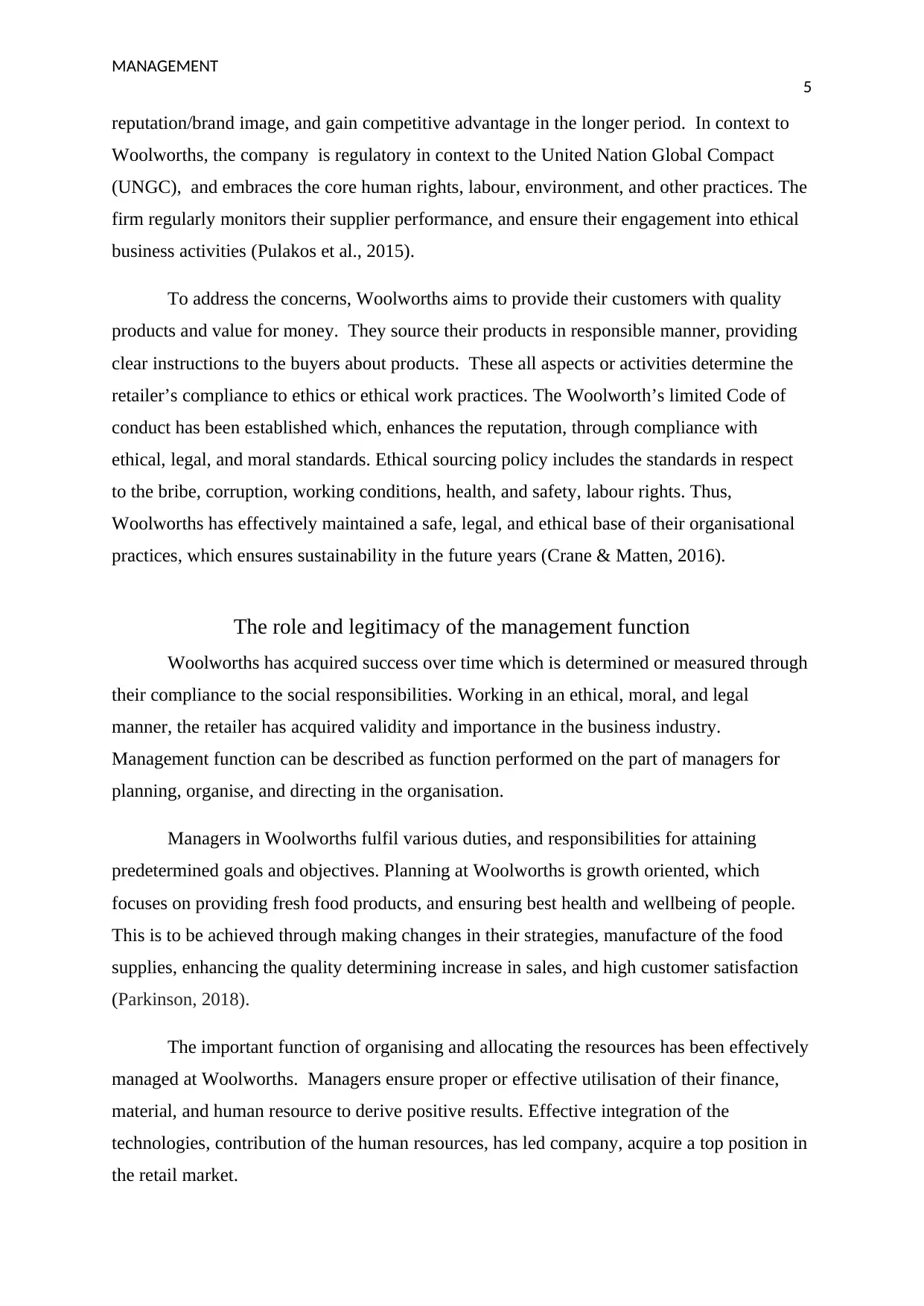
MANAGEMENT
5
reputation/brand image, and gain competitive advantage in the longer period. In context to
Woolworths, the company is regulatory in context to the United Nation Global Compact
(UNGC), and embraces the core human rights, labour, environment, and other practices. The
firm regularly monitors their supplier performance, and ensure their engagement into ethical
business activities (Pulakos et al., 2015).
To address the concerns, Woolworths aims to provide their customers with quality
products and value for money. They source their products in responsible manner, providing
clear instructions to the buyers about products. These all aspects or activities determine the
retailer’s compliance to ethics or ethical work practices. The Woolworth’s limited Code of
conduct has been established which, enhances the reputation, through compliance with
ethical, legal, and moral standards. Ethical sourcing policy includes the standards in respect
to the bribe, corruption, working conditions, health, and safety, labour rights. Thus,
Woolworths has effectively maintained a safe, legal, and ethical base of their organisational
practices, which ensures sustainability in the future years (Crane & Matten, 2016).
The role and legitimacy of the management function
Woolworths has acquired success over time which is determined or measured through
their compliance to the social responsibilities. Working in an ethical, moral, and legal
manner, the retailer has acquired validity and importance in the business industry.
Management function can be described as function performed on the part of managers for
planning, organise, and directing in the organisation.
Managers in Woolworths fulfil various duties, and responsibilities for attaining
predetermined goals and objectives. Planning at Woolworths is growth oriented, which
focuses on providing fresh food products, and ensuring best health and wellbeing of people.
This is to be achieved through making changes in their strategies, manufacture of the food
supplies, enhancing the quality determining increase in sales, and high customer satisfaction
(Parkinson, 2018).
The important function of organising and allocating the resources has been effectively
managed at Woolworths. Managers ensure proper or effective utilisation of their finance,
material, and human resource to derive positive results. Effective integration of the
technologies, contribution of the human resources, has led company, acquire a top position in
the retail market.
5
reputation/brand image, and gain competitive advantage in the longer period. In context to
Woolworths, the company is regulatory in context to the United Nation Global Compact
(UNGC), and embraces the core human rights, labour, environment, and other practices. The
firm regularly monitors their supplier performance, and ensure their engagement into ethical
business activities (Pulakos et al., 2015).
To address the concerns, Woolworths aims to provide their customers with quality
products and value for money. They source their products in responsible manner, providing
clear instructions to the buyers about products. These all aspects or activities determine the
retailer’s compliance to ethics or ethical work practices. The Woolworth’s limited Code of
conduct has been established which, enhances the reputation, through compliance with
ethical, legal, and moral standards. Ethical sourcing policy includes the standards in respect
to the bribe, corruption, working conditions, health, and safety, labour rights. Thus,
Woolworths has effectively maintained a safe, legal, and ethical base of their organisational
practices, which ensures sustainability in the future years (Crane & Matten, 2016).
The role and legitimacy of the management function
Woolworths has acquired success over time which is determined or measured through
their compliance to the social responsibilities. Working in an ethical, moral, and legal
manner, the retailer has acquired validity and importance in the business industry.
Management function can be described as function performed on the part of managers for
planning, organise, and directing in the organisation.
Managers in Woolworths fulfil various duties, and responsibilities for attaining
predetermined goals and objectives. Planning at Woolworths is growth oriented, which
focuses on providing fresh food products, and ensuring best health and wellbeing of people.
This is to be achieved through making changes in their strategies, manufacture of the food
supplies, enhancing the quality determining increase in sales, and high customer satisfaction
(Parkinson, 2018).
The important function of organising and allocating the resources has been effectively
managed at Woolworths. Managers ensure proper or effective utilisation of their finance,
material, and human resource to derive positive results. Effective integration of the
technologies, contribution of the human resources, has led company, acquire a top position in
the retail market.
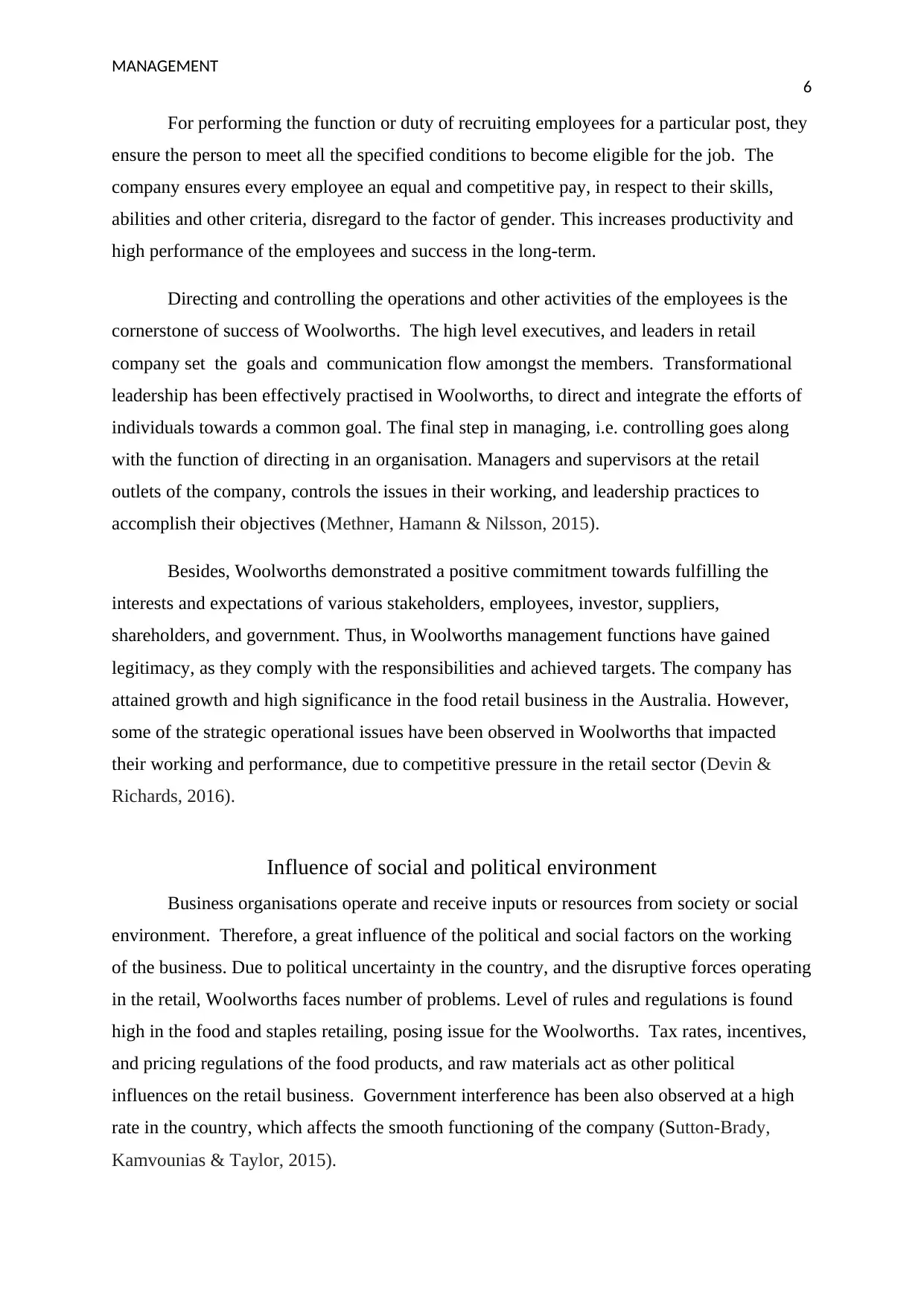
MANAGEMENT
6
For performing the function or duty of recruiting employees for a particular post, they
ensure the person to meet all the specified conditions to become eligible for the job. The
company ensures every employee an equal and competitive pay, in respect to their skills,
abilities and other criteria, disregard to the factor of gender. This increases productivity and
high performance of the employees and success in the long-term.
Directing and controlling the operations and other activities of the employees is the
cornerstone of success of Woolworths. The high level executives, and leaders in retail
company set the goals and communication flow amongst the members. Transformational
leadership has been effectively practised in Woolworths, to direct and integrate the efforts of
individuals towards a common goal. The final step in managing, i.e. controlling goes along
with the function of directing in an organisation. Managers and supervisors at the retail
outlets of the company, controls the issues in their working, and leadership practices to
accomplish their objectives (Methner, Hamann & Nilsson, 2015).
Besides, Woolworths demonstrated a positive commitment towards fulfilling the
interests and expectations of various stakeholders, employees, investor, suppliers,
shareholders, and government. Thus, in Woolworths management functions have gained
legitimacy, as they comply with the responsibilities and achieved targets. The company has
attained growth and high significance in the food retail business in the Australia. However,
some of the strategic operational issues have been observed in Woolworths that impacted
their working and performance, due to competitive pressure in the retail sector (Devin &
Richards, 2016).
Influence of social and political environment
Business organisations operate and receive inputs or resources from society or social
environment. Therefore, a great influence of the political and social factors on the working
of the business. Due to political uncertainty in the country, and the disruptive forces operating
in the retail, Woolworths faces number of problems. Level of rules and regulations is found
high in the food and staples retailing, posing issue for the Woolworths. Tax rates, incentives,
and pricing regulations of the food products, and raw materials act as other political
influences on the retail business. Government interference has been also observed at a high
rate in the country, which affects the smooth functioning of the company (Sutton-Brady,
Kamvounias & Taylor, 2015).
6
For performing the function or duty of recruiting employees for a particular post, they
ensure the person to meet all the specified conditions to become eligible for the job. The
company ensures every employee an equal and competitive pay, in respect to their skills,
abilities and other criteria, disregard to the factor of gender. This increases productivity and
high performance of the employees and success in the long-term.
Directing and controlling the operations and other activities of the employees is the
cornerstone of success of Woolworths. The high level executives, and leaders in retail
company set the goals and communication flow amongst the members. Transformational
leadership has been effectively practised in Woolworths, to direct and integrate the efforts of
individuals towards a common goal. The final step in managing, i.e. controlling goes along
with the function of directing in an organisation. Managers and supervisors at the retail
outlets of the company, controls the issues in their working, and leadership practices to
accomplish their objectives (Methner, Hamann & Nilsson, 2015).
Besides, Woolworths demonstrated a positive commitment towards fulfilling the
interests and expectations of various stakeholders, employees, investor, suppliers,
shareholders, and government. Thus, in Woolworths management functions have gained
legitimacy, as they comply with the responsibilities and achieved targets. The company has
attained growth and high significance in the food retail business in the Australia. However,
some of the strategic operational issues have been observed in Woolworths that impacted
their working and performance, due to competitive pressure in the retail sector (Devin &
Richards, 2016).
Influence of social and political environment
Business organisations operate and receive inputs or resources from society or social
environment. Therefore, a great influence of the political and social factors on the working
of the business. Due to political uncertainty in the country, and the disruptive forces operating
in the retail, Woolworths faces number of problems. Level of rules and regulations is found
high in the food and staples retailing, posing issue for the Woolworths. Tax rates, incentives,
and pricing regulations of the food products, and raw materials act as other political
influences on the retail business. Government interference has been also observed at a high
rate in the country, which affects the smooth functioning of the company (Sutton-Brady,
Kamvounias & Taylor, 2015).
Paraphrase This Document
Need a fresh take? Get an instant paraphrase of this document with our AI Paraphraser
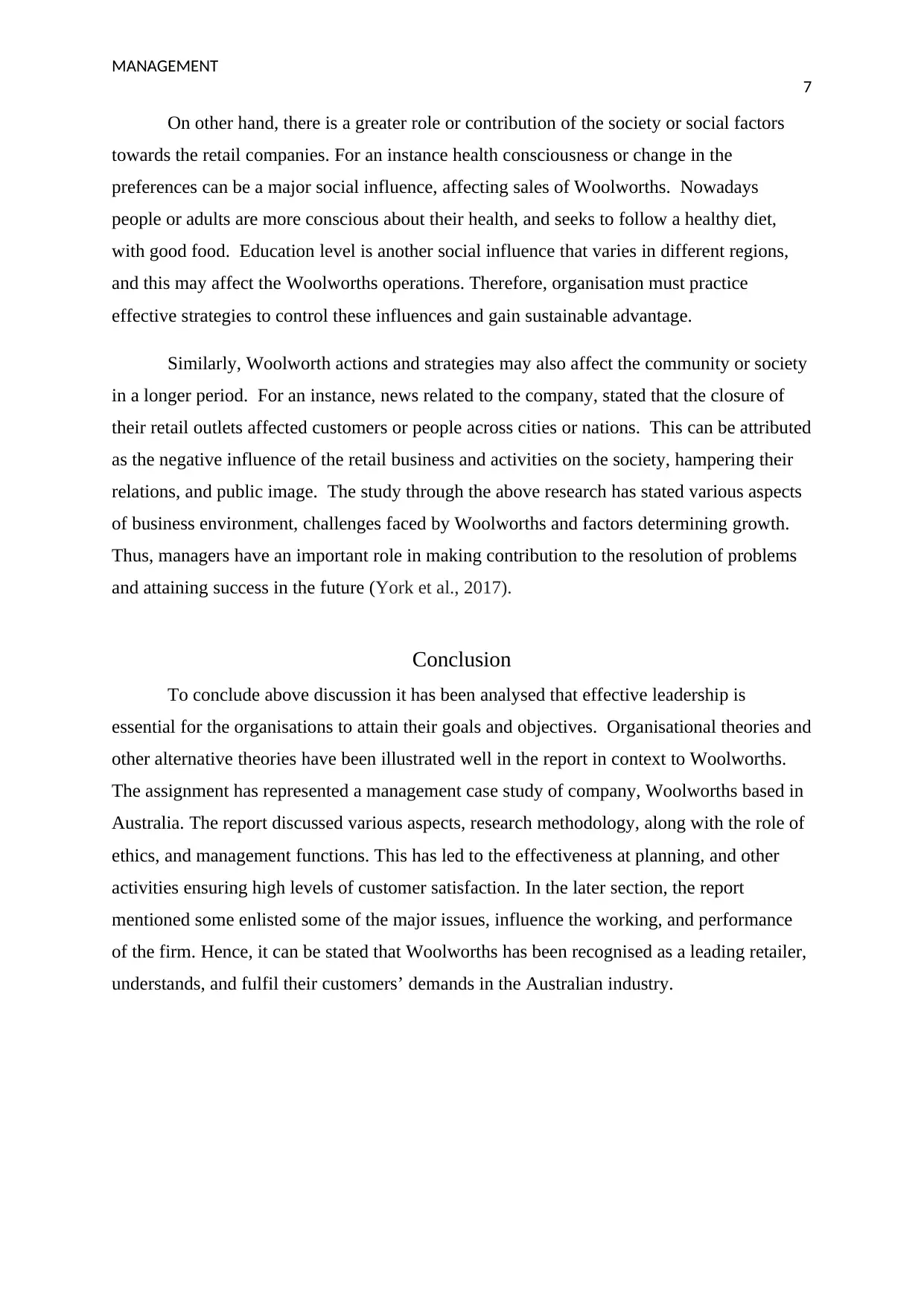
MANAGEMENT
7
On other hand, there is a greater role or contribution of the society or social factors
towards the retail companies. For an instance health consciousness or change in the
preferences can be a major social influence, affecting sales of Woolworths. Nowadays
people or adults are more conscious about their health, and seeks to follow a healthy diet,
with good food. Education level is another social influence that varies in different regions,
and this may affect the Woolworths operations. Therefore, organisation must practice
effective strategies to control these influences and gain sustainable advantage.
Similarly, Woolworth actions and strategies may also affect the community or society
in a longer period. For an instance, news related to the company, stated that the closure of
their retail outlets affected customers or people across cities or nations. This can be attributed
as the negative influence of the retail business and activities on the society, hampering their
relations, and public image. The study through the above research has stated various aspects
of business environment, challenges faced by Woolworths and factors determining growth.
Thus, managers have an important role in making contribution to the resolution of problems
and attaining success in the future (York et al., 2017).
Conclusion
To conclude above discussion it has been analysed that effective leadership is
essential for the organisations to attain their goals and objectives. Organisational theories and
other alternative theories have been illustrated well in the report in context to Woolworths.
The assignment has represented a management case study of company, Woolworths based in
Australia. The report discussed various aspects, research methodology, along with the role of
ethics, and management functions. This has led to the effectiveness at planning, and other
activities ensuring high levels of customer satisfaction. In the later section, the report
mentioned some enlisted some of the major issues, influence the working, and performance
of the firm. Hence, it can be stated that Woolworths has been recognised as a leading retailer,
understands, and fulfil their customers’ demands in the Australian industry.
7
On other hand, there is a greater role or contribution of the society or social factors
towards the retail companies. For an instance health consciousness or change in the
preferences can be a major social influence, affecting sales of Woolworths. Nowadays
people or adults are more conscious about their health, and seeks to follow a healthy diet,
with good food. Education level is another social influence that varies in different regions,
and this may affect the Woolworths operations. Therefore, organisation must practice
effective strategies to control these influences and gain sustainable advantage.
Similarly, Woolworth actions and strategies may also affect the community or society
in a longer period. For an instance, news related to the company, stated that the closure of
their retail outlets affected customers or people across cities or nations. This can be attributed
as the negative influence of the retail business and activities on the society, hampering their
relations, and public image. The study through the above research has stated various aspects
of business environment, challenges faced by Woolworths and factors determining growth.
Thus, managers have an important role in making contribution to the resolution of problems
and attaining success in the future (York et al., 2017).
Conclusion
To conclude above discussion it has been analysed that effective leadership is
essential for the organisations to attain their goals and objectives. Organisational theories and
other alternative theories have been illustrated well in the report in context to Woolworths.
The assignment has represented a management case study of company, Woolworths based in
Australia. The report discussed various aspects, research methodology, along with the role of
ethics, and management functions. This has led to the effectiveness at planning, and other
activities ensuring high levels of customer satisfaction. In the later section, the report
mentioned some enlisted some of the major issues, influence the working, and performance
of the firm. Hence, it can be stated that Woolworths has been recognised as a leading retailer,
understands, and fulfil their customers’ demands in the Australian industry.
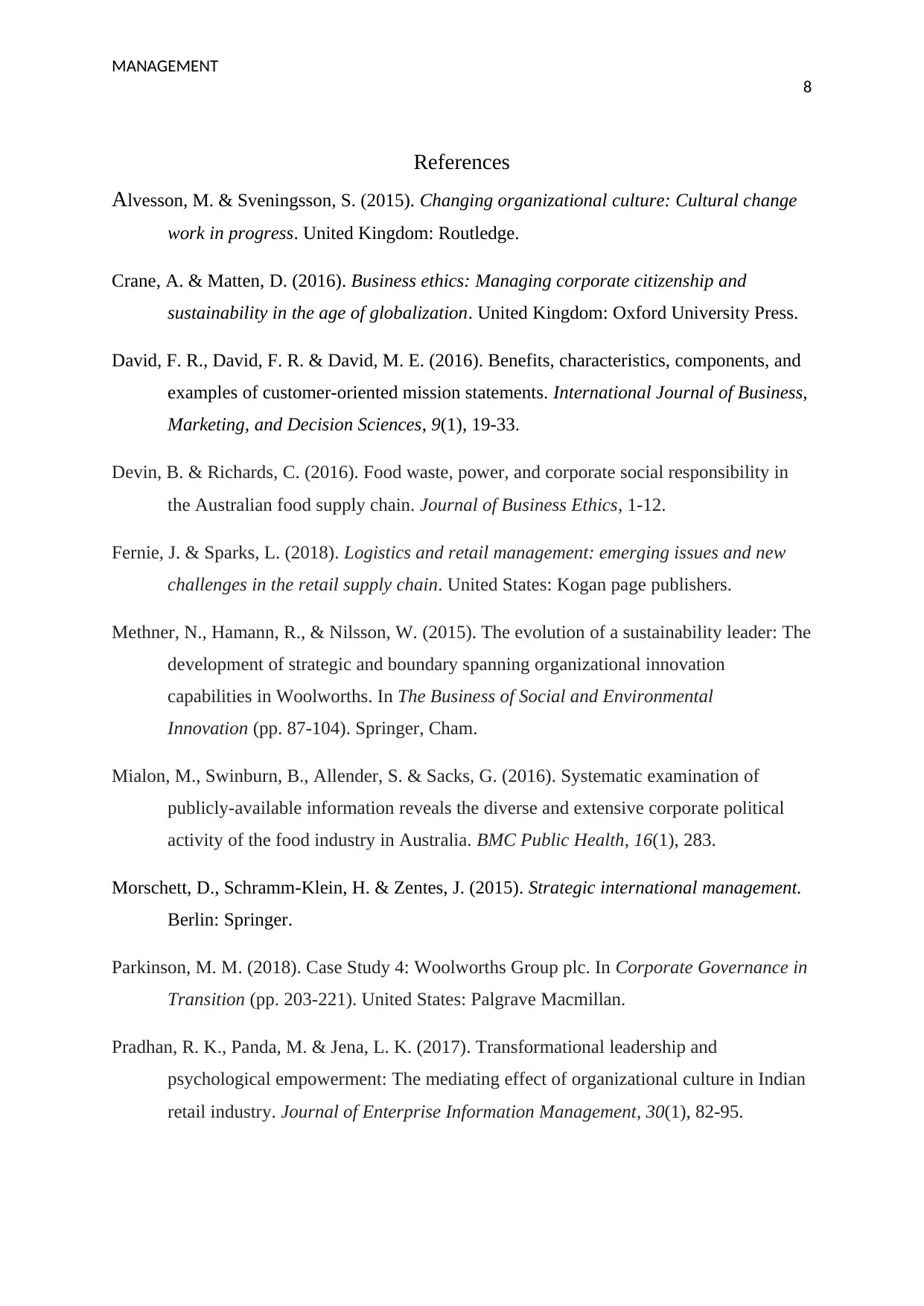
MANAGEMENT
8
References
Alvesson, M. & Sveningsson, S. (2015). Changing organizational culture: Cultural change
work in progress. United Kingdom: Routledge.
Crane, A. & Matten, D. (2016). Business ethics: Managing corporate citizenship and
sustainability in the age of globalization. United Kingdom: Oxford University Press.
David, F. R., David, F. R. & David, M. E. (2016). Benefits, characteristics, components, and
examples of customer-oriented mission statements. International Journal of Business,
Marketing, and Decision Sciences, 9(1), 19-33.
Devin, B. & Richards, C. (2016). Food waste, power, and corporate social responsibility in
the Australian food supply chain. Journal of Business Ethics, 1-12.
Fernie, J. & Sparks, L. (2018). Logistics and retail management: emerging issues and new
challenges in the retail supply chain. United States: Kogan page publishers.
Methner, N., Hamann, R., & Nilsson, W. (2015). The evolution of a sustainability leader: The
development of strategic and boundary spanning organizational innovation
capabilities in Woolworths. In The Business of Social and Environmental
Innovation (pp. 87-104). Springer, Cham.
Mialon, M., Swinburn, B., Allender, S. & Sacks, G. (2016). Systematic examination of
publicly-available information reveals the diverse and extensive corporate political
activity of the food industry in Australia. BMC Public Health, 16(1), 283.
Morschett, D., Schramm-Klein, H. & Zentes, J. (2015). Strategic international management.
Berlin: Springer.
Parkinson, M. M. (2018). Case Study 4: Woolworths Group plc. In Corporate Governance in
Transition (pp. 203-221). United States: Palgrave Macmillan.
Pradhan, R. K., Panda, M. & Jena, L. K. (2017). Transformational leadership and
psychological empowerment: The mediating effect of organizational culture in Indian
retail industry. Journal of Enterprise Information Management, 30(1), 82-95.
8
References
Alvesson, M. & Sveningsson, S. (2015). Changing organizational culture: Cultural change
work in progress. United Kingdom: Routledge.
Crane, A. & Matten, D. (2016). Business ethics: Managing corporate citizenship and
sustainability in the age of globalization. United Kingdom: Oxford University Press.
David, F. R., David, F. R. & David, M. E. (2016). Benefits, characteristics, components, and
examples of customer-oriented mission statements. International Journal of Business,
Marketing, and Decision Sciences, 9(1), 19-33.
Devin, B. & Richards, C. (2016). Food waste, power, and corporate social responsibility in
the Australian food supply chain. Journal of Business Ethics, 1-12.
Fernie, J. & Sparks, L. (2018). Logistics and retail management: emerging issues and new
challenges in the retail supply chain. United States: Kogan page publishers.
Methner, N., Hamann, R., & Nilsson, W. (2015). The evolution of a sustainability leader: The
development of strategic and boundary spanning organizational innovation
capabilities in Woolworths. In The Business of Social and Environmental
Innovation (pp. 87-104). Springer, Cham.
Mialon, M., Swinburn, B., Allender, S. & Sacks, G. (2016). Systematic examination of
publicly-available information reveals the diverse and extensive corporate political
activity of the food industry in Australia. BMC Public Health, 16(1), 283.
Morschett, D., Schramm-Klein, H. & Zentes, J. (2015). Strategic international management.
Berlin: Springer.
Parkinson, M. M. (2018). Case Study 4: Woolworths Group plc. In Corporate Governance in
Transition (pp. 203-221). United States: Palgrave Macmillan.
Pradhan, R. K., Panda, M. & Jena, L. K. (2017). Transformational leadership and
psychological empowerment: The mediating effect of organizational culture in Indian
retail industry. Journal of Enterprise Information Management, 30(1), 82-95.
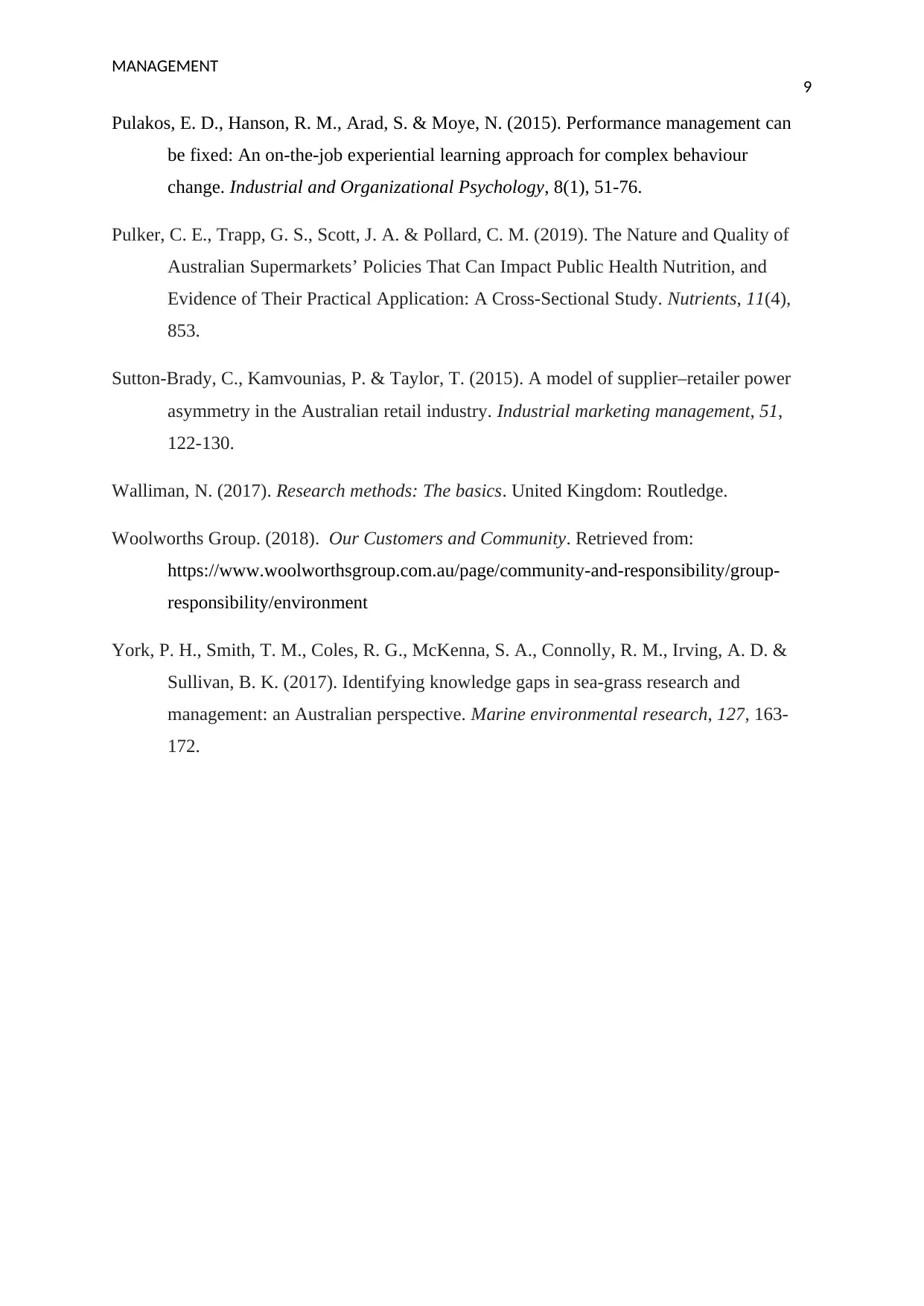
MANAGEMENT
9
Pulakos, E. D., Hanson, R. M., Arad, S. & Moye, N. (2015). Performance management can
be fixed: An on-the-job experiential learning approach for complex behaviour
change. Industrial and Organizational Psychology, 8(1), 51-76.
Pulker, C. E., Trapp, G. S., Scott, J. A. & Pollard, C. M. (2019). The Nature and Quality of
Australian Supermarkets’ Policies That Can Impact Public Health Nutrition, and
Evidence of Their Practical Application: A Cross-Sectional Study. Nutrients, 11(4),
853.
Sutton-Brady, C., Kamvounias, P. & Taylor, T. (2015). A model of supplier–retailer power
asymmetry in the Australian retail industry. Industrial marketing management, 51,
122-130.
Walliman, N. (2017). Research methods: The basics. United Kingdom: Routledge.
Woolworths Group. (2018). Our Customers and Community. Retrieved from:
https://www.woolworthsgroup.com.au/page/community-and-responsibility/group-
responsibility/environment
York, P. H., Smith, T. M., Coles, R. G., McKenna, S. A., Connolly, R. M., Irving, A. D. &
Sullivan, B. K. (2017). Identifying knowledge gaps in sea-grass research and
management: an Australian perspective. Marine environmental research, 127, 163-
172.
9
Pulakos, E. D., Hanson, R. M., Arad, S. & Moye, N. (2015). Performance management can
be fixed: An on-the-job experiential learning approach for complex behaviour
change. Industrial and Organizational Psychology, 8(1), 51-76.
Pulker, C. E., Trapp, G. S., Scott, J. A. & Pollard, C. M. (2019). The Nature and Quality of
Australian Supermarkets’ Policies That Can Impact Public Health Nutrition, and
Evidence of Their Practical Application: A Cross-Sectional Study. Nutrients, 11(4),
853.
Sutton-Brady, C., Kamvounias, P. & Taylor, T. (2015). A model of supplier–retailer power
asymmetry in the Australian retail industry. Industrial marketing management, 51,
122-130.
Walliman, N. (2017). Research methods: The basics. United Kingdom: Routledge.
Woolworths Group. (2018). Our Customers and Community. Retrieved from:
https://www.woolworthsgroup.com.au/page/community-and-responsibility/group-
responsibility/environment
York, P. H., Smith, T. M., Coles, R. G., McKenna, S. A., Connolly, R. M., Irving, A. D. &
Sullivan, B. K. (2017). Identifying knowledge gaps in sea-grass research and
management: an Australian perspective. Marine environmental research, 127, 163-
172.
1 out of 10
Your All-in-One AI-Powered Toolkit for Academic Success.
+13062052269
info@desklib.com
Available 24*7 on WhatsApp / Email
![[object Object]](/_next/static/media/star-bottom.7253800d.svg)
Unlock your academic potential
© 2024 | Zucol Services PVT LTD | All rights reserved.




